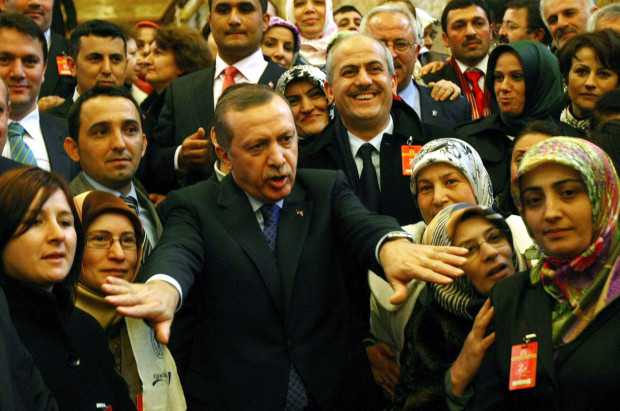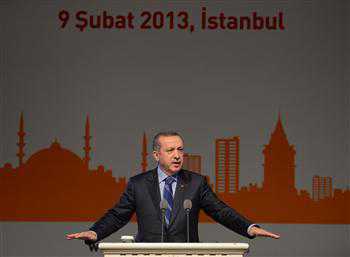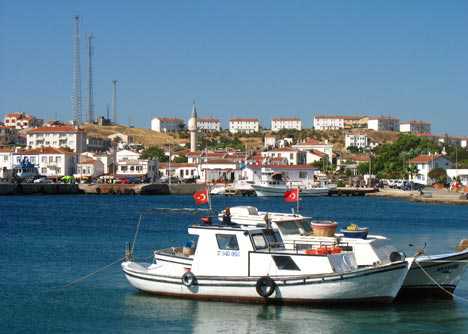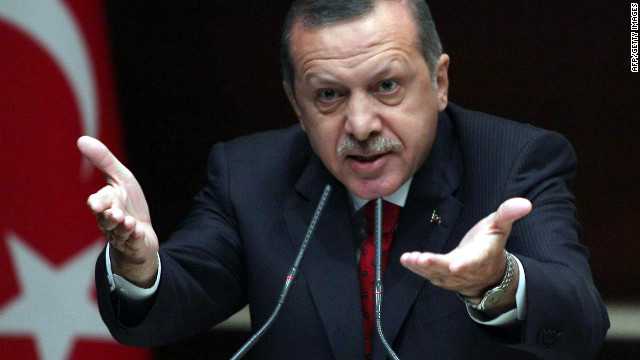ISTANBUL (CIHAN)- ‘There seems to be a contradiction between the earlier, more civilian, democracy-oriented reformist policies and the rather more recent authoritarian stance of the government. … Now, with the AK Party government’s rather secure position vis-à-vis the traditional tutelary power of the military and civilian — most notably judicial — bureaucracy, social and political protests of all sorts, ranging from Kemalist to Kurdish, from workers to women’s organizations, must be understood as manifestations of a political normalization process’
According to a long-time observer of politics, the ruling Justice and Development Party (AK Party) government contradicted its earlier reformist policies when it recently banned a public rally to mark the founding of the republic.
“Unfortunately, I am unable to understand the logic, if there is any, behind the government’s repressive attitude towards the street celebrations on Republic Day,” said Professor Levent Köker, who has been studying Kemalism and democracy.
Each October and November in recent years, Turkey has seen days of tension surrounding the commemorations of Oct. 29, Republic Day, and Nov. 10, the anniversary of the death of the nation’s founder, Mustafa Kemal Atatürk. Although this year’s Republic Day has passed, the leaders of the governing and main opposition parties are still involved in a tug-of-war over it that is not likely to end soon.
Prime Minister Recep Tayyip Erdogan furiously slammed the opposition Republican People’s Party (CHP) leader for attending the banned march instead of the official celebrations held in Ankara’s hippodrome. He accused the protesters of terrorizing city streets and said the CHP is trying to divide the country under the guise of republicanism.
In order to understand the debates surrounding Atatürk and Kemalism, which have come to dominate the agenda almost every year around these important anniversaries for Turkey, we asked Professor Köker what it all means and where it will lead.
*** There are a couple of terms in relation to Atatürk in Turkey; one is Kemalism and the other is Atatürkist, or “Atatürkçü” in Turkish. What is the difference between the two?
First of all, we have to note that this is a matter of history. “Kemalist” was a term first used in the 1920s by foreign observers to denote the followers of Mustafa Kemal who were also the members of the “First Group” in the Grand National Assembly. Later, in the 1935 program adopted by the General Congress of the Republican People’s Party [CHF, later CHP], Kemalism was the term describing the outlines of the party’s blueprint for Turkish society. From then onwards, Kemalism [was] used to refer to the ideology of the RPP [CHP] during the formative single-party period of the Turkish Republic.
Atatürkist was a term, on the other hand, used by individuals who were in fact opposing Ismet Inönü’s rule after Atatürk’s death in 1938 but [could not] express their oppositional position openly during the repressive years of Inönü’s administration — “National Chief” or “Millî Sef” in Turkish were the terms used at the time, having strong affinities with then-popular German “Führer” or Italian “Il Duce.”
When Turkey became a multi-party democracy after 1945, Atatürkism [was] invented to describe initially the political and ideological position of the opposition — mainly the “Demokrat Parti” [Democrat Party or DP] that took power from the CHP after an electoral victory in May 1950. All in all, Kemalism was the CHP’s political ideology in the single-party period while Atatürkism was the “alternative” term used by the CHP’s opponents who represented more traditional — thus conservative — segments in Turkish society. Having said this, however, we should note also that nationalism has been the common denominator of the two. One final note at this point is that Atatürkism [was named] the official state ideology after the 1980 military coup and constitutionalized under the banner of “the principles and reforms of Atatürk” [Atatürk Ilkeleri ve Inkilaplari].
*** Now, who are the people called “ulusalci” [sometimes called neo-nationalists or modernist nationalists] in Turkish? How much Kemalism goes into being an “ulusalci”?
There has always been a difference, thus a cleavage and tension between two different types of nationalism in Turkey. Bearing in mind that nationalism here refers to any political ideology that aims at uniting — or preserving and sustaining the unity of — the nation and the state, Kemalist nationalism has been modernist, with strong emphases on secularism — “lâiklik” or laicité — while Atatürkist nationalism has defined itself on conservative grounds. As far as the latter cherished politically the traditional values and life practices of the popular masses, it [was] inevitable [that it would] criticize the top-down modernization policies of the Kemalist ideology with a state-centered control over religion. Against this backdrop, I have to say that “ulusalcilik” and Kemalism are inextricably intertwined ideological positions. Let’s not forget the fact that the Turkish term “ulus,” hence “ulusçuluk” and then “ulusalcilik,” [was] coined to replace the Ottoman term “millet,” [and] hence “milliyetçilik,” a word of Arabic origin [having] overtly religious connotations.
*** The tension in the country tends to be high every year on days of official celebrations, especially on Oct. 29, Republic Day. This year saw big demonstrations and even clashes with the police, especially after the AK Party government banned a street celebration citing security threats. First, why do you think the government banned that celebration? And then what do you think made this year’s celebrations different than those of the past few years as far as tensions in society go?
Unfortunately, I am unable to understand the logic, if there is any, behind the government’s repressive attitude towards the street celebrations on Republic Day. Recently, in the official celebrations of certain national days, the government opted for a less “statist” and thus less “militarized” way of sharing the meaning of these festivities with the general public. As a corollary to this, the government tried also to eliminate ceremonies echoing the proto-fascist years of the single-party era, i.e. the 1930s and ’40s. This makes it more incomprehensible to account for the “logic” behind the prohibitionist attitude towards not only street celebrations of Republic Day but also other public presentations of oppositional groups in Turkey.
*** What do you have in mind in that regard? Would you give a few examples of such restrictions on “other public presentations of oppositional groups”?
What I am trying to suggest is that there seems to be a contradiction between the earlier, more civilian, democracy-oriented reformist policies and the rather more recent authoritarian stance of the government. The logic and symbolism behind the Republican demonstrations of 2007 were manifestations of political opposition. In the 2007 demonstrations, the civil society organizations [were] apparently calling for a non-democratic intervention to save the republic. Now, with the AK Party government’s rather secure position vis-à-vis the traditional tutelary power of the military and civilian — most notably judicial — bureaucracy, social and political protests of all sorts, ranging from Kemalist to Kurdish, from workers to women’s organizations, must be understood as manifestations of a political normalization process. Abundant recent examples can be given, from atrocities witnessed in student protests to the prime minister’s intolerant approach against women to violent suppression of Kurdish, pro-BDP [Peace and Democracy Party] opposition, especially in the southeastern parts of the country.
*** Each year on Nov. 10, the day Atatürk died, Turkey mourns, and there is even nostalgia for the old days when Atatürk was alive. Some people in society genuinely believe that if Atatürk were alive he would save the country. Is this healthy thinking?
Of course not. It is not inconceivable, however, that there are individuals and groups in Turkish society who envision the past and future of Turkish society from within a cyclical notion of time, the beginning point of which [was] of course a “golden age,” that is the age of Kemal Atatürk. This is a very common and well-entrenched but ironically pre- or non-modern way of historical consciousness.
*** Where do you think this type of historical consciousness comes from? Is it mainly rooted in the Turkish education system so that it has been passed from one generation to another?
Serif Mardin, one of the leading scholars of modern Turkish society and politics … observed once that the first generation of Ottoman intellectuals in the mid to late 19th century did not pay much attention to socialism; their ideas were mostly influenced by some version of solidarism. For Professor Mardin, one of the reasons behind this was that the “New Ottomans,” having [been] socialized by the norms of an Islamic culture with a strong emphasis on the integrity of a religious community, did not find appealing an ideology like socialism that puts the emphasis on class divisions and conflict. In line with this analysis, I assume that the same solidarist-corporatist state-of-mind still dominates the Kemalist circles and their way of approaching modern Turkish history, perhaps unknowingly, within the terminology of “divinity,” represented by Mustafa Kemal, founder of a modern nation as a “modern umma [religious community].” Formal education may be influential in the continuous reproduction of this mentality, but still I think the role played by the well-entrenched traditionalism seems to be the predominant factor.
*** There is an understanding in Turkey that if you are a Kemalist, you are secular, but if you are not a Kemalist, you favor religious rule in the country. What would you say about this perception in society? Do you see a basis for that thinking?
The only basis for this way of thinking is the difference between the modern and traditional/conservative forms of nationalism prevailing now in Turkey. As I tried to explain before, Kemalist nationalism has always been a secularist ideology aiming at strong state control over religious institutions and religious social practices. In the eyes of a modernist, Islam can only be secularized if it is put under the strict control of a secularist-modernist state authority. As many observers of Turkish secularism have stressed, this type of secularism is quite different and even contradictory to the essence of secularism as a democratizing principle insisting on the separation of religion and state, thus freeing the religious social sphere from the political hold of state power. Present-day Kemalists, like their predecessors of the 1930s, believe that democratic secularism in a Muslim society is impossible, thus [there is] a strong relationship between being Kemalist and secular in this authoritarian-statist sense.
*** According to some observers, Kemalism has been the “new Islam” for a long time. What is your evaluation in that regard of Turkey today?
There is an important truth in this evaluation. Briefly put, Kemalism as the epitaph of the RPP’s blueprint for Turkish society [is] an ideology following the tracks of Comtean positivism … in which science replaced religion as the sole “guide or “mürsid” in life. The late Ernest Gellner [related to] us a very illustrative personal experience [after] he witnessed the affinities between a religious preacher and a Kemalist orator.
*** Would you tell us more about this? What are the similarities that Gellner talked about?
I cannot make direct quotations from Gellner’s writings, but my reference is to his article “Kemalism” in “Encounters with Nationalism.” An example like Behçet Kemal Çaglar, a renowned Kemalist poet of the time, comes to mind. He [was] a very telling example of how Kemalism was conceived as a new religion, a religion of scientism or a religion in which a personal cult of Atatürk made itself through a process which kind of deified the republican founder. One may see a contradiction between scientism or positivism and the making of a personal cult, but we are not talking about the formation of a coherent and consistent ideology. What was then taking place was rather a formative process of charisma.
*** What is the profile of a typical Kemalist in Turkey today?
Apart from the hardliners, many Kemalists in today’s Turkey are modernist individuals and groups from older, relatively well-established urban middle classes who do not have well-defined political ideologies but became Kemalist recently, just as a consequence of some AK Party policies which made Islam more visible publicly and politically and which these individuals see as a threat to the secularist Turkishness of the republic. Thus, a typical Kemalist is an individual who opposes AK Party rule, regards the Kurdish question as a pseudo-issue invented by the imperial powers with an aim to divide Turkey and destroy the republic [and views] the public presence of Islamic symbols, most notably women’s headscarves, as developments that undermine Atatürk’s secularist legacy.
*** Talking about secularism — one of the main issues in Turkey today — do you think Turkish society has been engaged in a true debate about secularism, especially when Turkey is trying to write its new constitution? As much as Turkey has pride that it is a secular country, there seems to be a crooked understanding of secularism, reducing it to the presence of Islamic symbols, as you said, women’s headscarves…
Our discussion of secularism or laicism has been going on for decades. The substance of the issue stems from the central role given by the Republican Kemalist project to the Religious Affairs Directorate [Diyanet]. This role, from a Kemalist perspective, is to establish state-centered control over the belief, worship and morality of Turkish society. This has been envisioned as the most influential way of secularizing an otherwise unsecularizable religion and culture, i.e., Islam. This central statist control of religious life continues still, but now the control is in the hands of a government that has its political-ideological roots, at least partly, in Islam. I think this is a genuine opportunity for Turkey to come to terms with its unsecular, oppressive policies of laicism and, having resolved at least on the basis of societal goodwill the headscarf issue now, Turkey is on the right track to democratize itself further.
*** As you said earlier, there is a certain cleavage and tension between “ulusalcilar” [modernist nationalists] and “milliyetçiler” [traditional nationalists]. Where do you see this tension going, as both sides seem unwilling to compromise?
I think the conflict of [these forms of] nationalisms is at its peak now and I do not see any reason for this conflict to become more acute than ever. This tension, in varying degrees, may exist forever, but its power of influence will fade away as Turkey realizes at a more societal level the inevitability of the advancement of democratization.
*** What is the situation regarding to Kemalism today? Who are today’s Kemalists and what is different about them from the Kemalists of the past? Are they all from the CHP?
Present-day Kemalists in Turkey comprise some die-hard modernist nationalists and some traditional nationalists, all with a strong belief that the advancement of democracy and human rights threaten the integrity of the nation-state — a belief that keeps the Kurdish question in a deadlock — and its secularist characteristic, and all with a negative attitude vis-à-vis the democratizing potential of Turkey’s presence in the Council of Europe and prospective EU membership. Most of the former include members and constituencies of the CHP, some others being closer to the IP [Worker’s Party] or other members of the Turkish left. Among the latter, the bulk of the traditional nationalists are represented by the MHP [Nationalist Movement Party] but, interestingly, [have] a presence in the ruling AK Party as well. This results in the formation of a Turkish political public sphere dominated extremely by Turkish nationalism, making further democratizing reforms virtually impossible.
*** In other words, there are too many nationalists in Parliament and not enough progressive thinking to further democratize the country. So, do you think this picture of Parliament is representative of Turkish society?
Practically, yes. This may be an unfortunate situation which may not be conducive for further democratization. It should be understood, however, that Turkey has become a relatively deeply divided society on certain critical issues like the Kurdish problem or the problems stemming from religious and other identities and differences. Be as it may, however, we should also note that political leadership, especially the leadership of the ruling AK Party, has the capacity to change the attitude of its inner and outer circles of support. We … witnessed how influential this leadership can be [in] 2004 and 2005, when the party was vigorously active in proceeding with the required reforms for EU membership. I think it is still the case that despite societal cleavages paving way to the formation and thus clash of different nationalisms in society and politics, the leadership is capable of transforming this state of affairs to a more democracy-oriented change.
PROFILE:
Dr. Levent Köker
Currently a member of the faculty of law of Atilim University in Ankara, Professor Levent Köker was part of a six-person team of academics in 2007 to prepare a draft of the Turkish constitution.
Professor Köker graduated from Ankara University Law School in 1980 and received an M.A. in political science from Ankara University in 1983. In 1996, he was promoted to full professor of public law at Gazi University Law School. Köker was a British Council Fellow at Mansfield College, Oxford University (1984-1985), and a Fulbright Fellow (1994-1995) at the Center of International Studies of Princeton University.
His books include “Modernlesme, Kemalizm ve Demokrasi” (Modernization, Kemalism and Democracy), “Iki Farkli Siyaset” (Two Different Conceptions of Politics) and “Demokrasi, Elestiri ve Türkiye” (Democracy, Critique and Turkey). CIHAN
Copyright 2012 Cihan News Agency
Provided by Syndigate.info, an Albawaba.com company
All Rights ReservedWire News provided by






